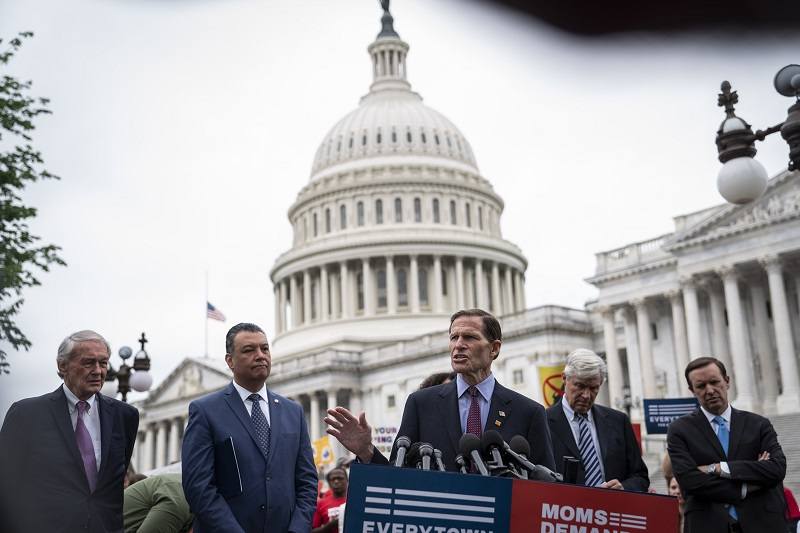
Sen. Richard Blumenthal, D-Conn., speaks during a news conference demanding action on gun control legislation two days after a gunman killed 19 children and two teachers in a Texas elementary school, on Capitol Hill on Thursday, May 26, 2022.
17:35 JST, June 6, 2022
WASHINGTON – Key senators said Sunday there is growing momentum to forge a bipartisan congressional response to recent mass shootings that could toughen federal gun laws for the first time in a generation. But a deal is not yet in hand, they warned, and the delicate talks are expected to continue for several more days as negotiators seek to garner enough Republican support to get a compromise bill through the Senate.
Should an agreement come together, it is certain to fall well short of the parameters that President Joe Biden laid out in a White House address on Thursday, when he called for renewing the federal assault weapons ban that expired in 2004, as well as significantly expanding federal background checks for gun buyers and removing the firearms industry’s immunity from lawsuits.
But a proposal that would encourage states to set up red-flag laws that would allow authorities to keep guns away from people thought to be a threat to their communities or themselves remains under keen discussion, as do measures tackling school security and mental health, according to people involved in the discussions.
“It’s really tough sledding. But I’ve never been part of conversations that are this serious and this thoughtful before, and I know all the Republicans and Democrats who are at the table are there with total sincerity to get an agreement,” Sen. Chris Murphy (Conn.), the Democratic negotiator, said in an interview Sunday.
Sen. Pat Toomey, R-Pa., another member of the small group of senators hashing out a potential deal, said on CBS’s “Face The Nation” that the discussions, while “intensive,” do not “guarantee any outcome.”
“But it feels to me like we are closer than we’ve been since I’ve been in the Senate,” said Toomey, who co-led a failed 2013 effort to expand criminal background checks for gun buyers after the Sandy Hook Elementary School shooting.
The negotiators – and Democratic leaders – have seized on a growing sense of national outrage following the May 14 attack that took 10 lives at a Buffalo supermarket and the May 24 massacre of 19 children and two teachers inside Robb Elementary School in Uvalde, Texas. Other shootings with multiple victims have followed, including incidents in Tulsa; Ames, Iowa; and overnight Saturday in Philadelphia and Chattanooga, Tenn. By one measure, there have already been more than 200 mass shootings in 2022.
Public polling shows consistently strong support for expanding background checks for gun buyers. Surveys taken after mass shootings frequently show strong support for tighter gun laws – 54% vs. 16% wanting less strict laws, according to a May CBS News/YouGov poll taken after Buffalo but before Uvalde – though that support tends to recede as public attention fades.
Having seen previous attempts at negotiation fizzle as violent incidents left the headlines, Senate Majority Leader Chuck Schumer, D-N.Y., signaled last month after the Uvalde shooting that he had limited patience for extended talks. He gave the group 10 days – until the Senate returns on Monday from a week-long recess – to show substantial progress toward an agreement.
Murphy said he spoke to Schumer on Sunday morning and that the deadline has been extended, modestly. “He still feels like we need to come to an agreement by the end of this week,” Murphy said, adding, “I think that’s entirely possible.” Schumer spokesman Justin Goodman did not address the timeline but said the senator supports the bipartisan group and looks forward to discussing its proposals with the Democratic caucus this week.
Asked about the pace of the negotiations, a GOP aide familiar with the negotiations said, “We’re aware of the artificial timeline Senator Schumer has created.” The aide spoke on the condition of anonymity to candidly describe the talks.
Sen. John Cornyn of Texas, who is leading the talks for Republicans, said in an interview Thursday that he shared a sense of urgency. “I think we need to act, and we need to act relatively quickly,” he told The Washington Post. “We could lose this opportunity to do what we could to save lives, which to me is what this is all about.”
While Republicans have long emerged as unflinching defenders of gun rights, encouraged by a voting base that includes millions of gun owners, there are signs that GOP lawmakers may have more negotiating space than in the past.
An open letter published Sunday in the Dallas Morning News signed by more than 250 prominent Texas conservatives offered support to Cornyn as “the right man to lead this bipartisan effort.” The signers also endorsed a federal red-flag law and expanded background checks.
In an interview Friday, the key Democrat negotiating a federal red-flag provision, Sen. Richard Blumenthal of Connecticut, said he was encouraged by the progress that had been made on that aspect of the negotiations.
Blumenthal said he and Sen. Lindsey Graham, R-S.C., had come to an agreement between the two of them on a basic framework for legislation that would create a system of incentives, grants and federal standards for states that create their own red-flag laws. But he said details were still being hashed out as the discussion moved to a wider group of bipartisan negotiators. A spokesman for Graham did not respond to a request for comment.
It remained unclear, Blumenthal said, if any iteration of the proposal could garner the necessary 60 votes – which would mean a minimum of 10 Republicans if all 50 members of the Democratic caucus backed a deal.
“It’s not final until it’s final, and we need 60 votes,” he said. “We’re now going beyond the two of us to 10 of us, and we also need to be mindful of 60 of us, because all of the optimism in the world will fail to save lives unless we make it law.”
As for background checks, talks are still underway. Any deal would be much more limited than previous expansion proposals, such as the legislation drafted in 2013 by Toomey and Sen. Joe Manchin, D-W.Va.
Cornyn said Thursday that he is willing to consider expanding the scope of criminal records that can block a gun sale under the federal instant background check system to include juvenile records. That could theoretically block a sale to a young gun buyer who has been judged responsible for a criminal act in sealed juvenile proceedings but has no adult record.
The Buffalo and Uvalde attacks involved 18-year-olds and legally purchased weapons. It remains unclear in both cases whether there were juvenile records that might have blocked those sales.
Cornyn said he favored a “limited, careful, confidential look-back” to ensure that young gun buyers are more closely scrutinized. “If they had been an adult with this same record, they would have been disqualified by the background check system,” he said.
“We all agree that violent criminals and deranged, dangerously mentally ill people shouldn’t have firearms,” Toomey said Sunday. “So we need a mechanism to increase the likelihood that will identify such a person and prevent them from buying a gun legally anyway.”
Other proposals related to school security and mental health have been floated during both private discussions and public forums. Graham on Friday tweeted a proposal to “create a certification process that allows former military members to go through school security training” and carry weapons in schools.
“Our schools are soft targets,” he said. “They contain our most valuable possession – our children, the future of our country – and must be protected.”
While Democrats have tended to react coldly to proposals that would arm school staff, Murphy on Sunday lent tentative support to Graham’s idea. “There’s no doubt there’s going to be an increased demand for school security officers. It would be perfectly appropriate and, in some ways preferable, for veterans with significant training to fill those positions,” he said.
Other elements likely to be included in a package is significant federal funding for both school security and mental health programs. Murphy said he thought congressional Republicans could be willing to follow the lead of Florida lawmakers after the 2018 shooting at Marjory Stoneman Douglas High School. Within a month, a GOP-majority legislature and GOP governor in the state enacted legislation that included significant new gun restrictions as well as $400 million in funding.
“I don’t think we’re going to copy anybody else’s law – we’re going to have to come up with a unique compromise in the Senate,” Murphy said. But he praised the gun provisions, mental health funding and school safety money that the Florida law provided: “That makes a lot of sense, and it’s consistent with the discussions we’ve had.”
In a rare national prime-time address on Thursday, Biden advocated for relatively far-reaching proposals such as the assault weapons ban. But he acknowledged that the current Congress, with a 50-50 Senate and a thin House majority, would probably not be raring to embrace them.
He suggested more modest alternatives, such as raising the minimum age for assault weapon purchases to 21 from 18. Even that, negotiators have said in recent days, is unlikely given conservative reticence to ban firearms or ammunition of any type.
Biden’s overarching plea, however, was for Congress to do something, anything, to break nearly three decades of inaction on guns: “Enough, enough, enough,” he said in closing.
While he lent support to the bipartisan talks on Thursday, he also added a dig at the GOP: “The fact that the majority of the Senate Republicans don’t want any of these proposals even to be debated or come up for a vote, I find unconscionable.”
That grated on the ears of Republican senators and aides who were perplexed at Biden’s decision to give a national address advocating for provisions that few, if any, conservative lawmakers could support – and which Democrats in the bipartisan Senate group weren’t even seriously pursuing.
Graham, for instance, quickly tweeted that he was “ready to work across the aisle to find common ground – something that was absent from President Biden’s address to the nation.”
Toomey on Sunday chided Biden for putting forth “policies that he knows for sure have no chance of passing the Senate, probably couldn’t even get 50 votes and hold the Democrats, much less get the 60 we would need.”
But Biden’s sharp speech does not appear to have derailed the talks, which never included many of the provisions he called for. “It was unhelpful,” said the Republican aide briefed on the talks. “But, also, he’s irrelevant.”
The biggest factor pushing the two parties toward the kind of deal that has been elusive in the past, Murphy said Sunday, is a “collective sense of the cost of failure.”
“I think parents and kids are really scared right now, and for us to let our politics get in the way of providing them an answer, and comfort, would be devastating,” he said. “But, you know, this is the most politically complicated and emotionally fraught issue that Congress deals with. There’s a reason why we haven’t made progress on this for 30 years.”
Top Articles in News Services
-

Prudential Life Expected to Face Inspection over Fraud
-

Hong Kong Ex-Publisher Jimmy Lai’s Sentence Raises International Outcry as China Defends It
-

Japan’s Nikkei Stock Average Touches 58,000 as Yen, Jgbs Rally on Election Fallout (UPDATE 1)
-

Trump Names Former Federal Reserve Governor Warsh as the Next Fed Chair, Replacing Powell
-

Suzuki Overtakes Nissan as Japan’s Third‑Largest Automaker in 2025
JN ACCESS RANKING
-

Japan Institute to Use Domestic Commercial Optical Lattice Clock to Set Japan Standard Time
-

Israeli Ambassador to Japan Speaks about Japan’s Role in the Reconstruction of Gaza
-

Man Infected with Measles May Have Come in Contact with Many People in Tokyo, Went to Store, Restaurant Around When Symptoms Emerged
-

Prudential Life Insurance Plans to Fully Compensate for Damages Caused by Fraudulent Actions Without Waiting for Third-Party Committee Review
-

Woman with Measles Visited Hospital in Tokyo Multiple Times Before Being Diagnosed with Disease























